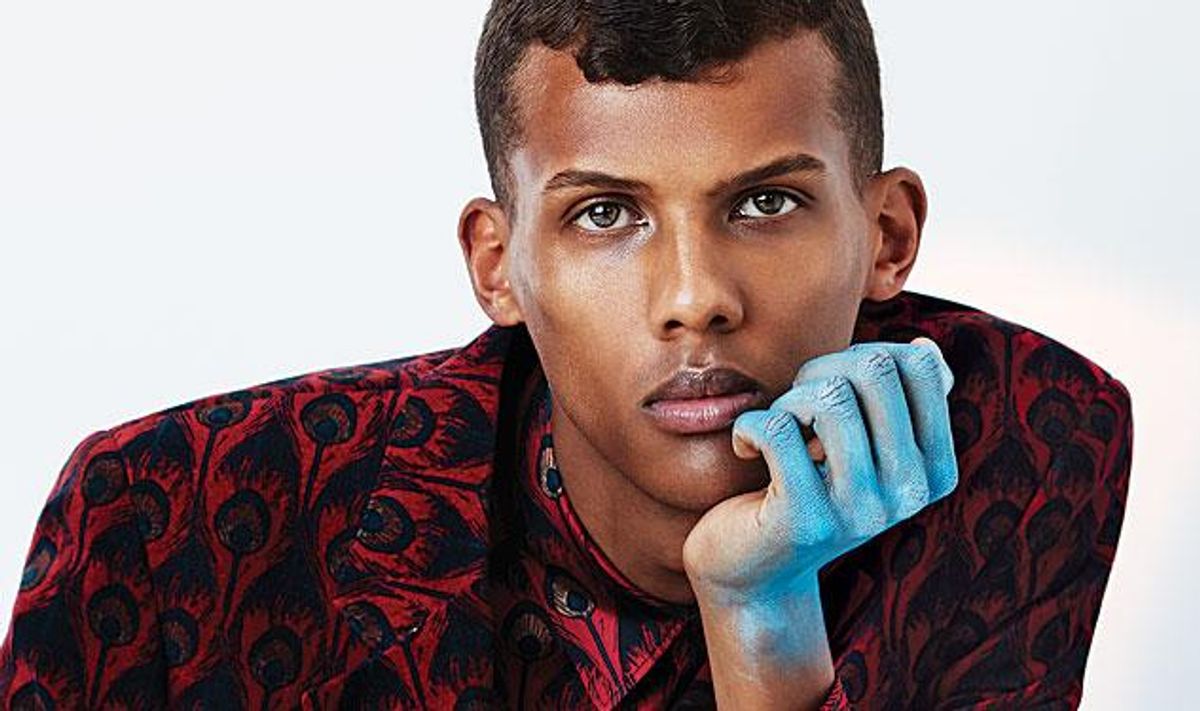
How Belgian sensation Stromae is redefining what it means to be a contemporary male pop star
August 05 2014 10:30 AM EST
February 05 2015 9:27 PM EST
By continuing to use our site, you agree to our Private Policy and Terms of Use.

Toss some French lyrics into an American pop song and you immediately turn up the heat (cue Beyonce's "Partition," Lady Gaga's "Bad Romance"). But when foreign artists attempt to crack the Billboard charts with a single in their native tongue, audiences tend to turn a deaf ear. (The last time a non-U.S. act scored a number 1 hit sung entirely in another language? Los Lobos's "La Bamba" -- in 1987.) This fact isn't lost on Paul Van Haver, the Belgian pop star better known as Stromae, but given his recent musical output and the visuals that accompany it, the singer-songwriter is prepared to smash that barrier wide open.
In the past five years, the 29-year-old discovery has become a sensation across the Atlantic. His 2009 debut single, "Alors On Danse" ("So We Dance"), hit number 1 in 19 countries. A club banger that mocks the 9-to-5 lifestyle, the track introduced Stromae's tragicomic narratives, pulsing beats, and catchy, horn-spiked melodies to a worldwide audience and caught the attention of Kanye West, who remixed it. Since then he's collaborated with Will.i.am, Angel Haze, and Major Lazer, and released his latest album, , or Racine Carree ("Square Root"), a record that sold nearly 3 million copies and included the rollicking jam "Ta Fete," which this summer became the Belgian soccer team's World Cup anthem.
"A friend of mine sent me a link to one of his DIY videos and I had an instant artistic crush," recalls Romain Bilharz, Stromae's A&R man. "I loved his singularity, his alien-like quality. He also had this particular tone, lyrics that addressed people with derision and depth at the same time."
Whether listeners comprehend those lyrics shouldn't matter, at least according to the man who wrote them. "In Europe we listen to a lot of music in English and dance to it without understanding the words," says Stromae, who stands at a towering 6-foot-2, with bright green eyes. "Why wouldn't the American audience be able to do the same?" Still, English-speaking fans can at least find subtitles in his latest videos, offering them a chance to appreciate his knack for casting serious themes like race, global warming, and STDs against the backdrop of an after-hours Ibiza blowout. His biggest hit to date, "Papaoutai" ("Dad Where Are You"), is a cry for paternal love buoyed by layers of upbeat electronica and African drums. It is inspired by his own childhood heartbreak: Stromae's father, a Rwandan architect, left home shortly after the musician's birth, and was later killed in the 1994 Tutsi genocide.
Yet Stromae is quick to stress that his songwriting transcends his own experience. "My life impacts my vision, but it only makes up about 20% of it," he says. "I see myself in everything I create, but it's more subjective than that -- it's just human instinct. If I didn't speak about the human condition in general then I wouldn't have much to sing about."
Photography by Aingeru Zorita | Suit and shirt by Marc Jacobs | Market Editor: Michael Cook. Fashion Assistant: Jamie Chadroff. Hair and Makeup: Akiko Sakamoto. Prop Stylist: Ian Salter.

For "Tous les Memes," an infectious tango about quarreling lovers, Stromae sings from the perspective of both genders, and presents himself in half-drag for live performances of the song. He also recently posed in character for a shoot for the French gay magazine Tetu in which he married himself; the story was published while the debate on same-sex marriage seemed to be tearing the country apart. "Many thought I was gay even before I did that," Stromae says. "It didn't bother me, but I was worried about getting dragged into the polemics. There's no need to make a fuss about it. It's something that only concerns gay people."
"In the end, because his face is still half man and half woman in both outfits, it offers every possibility of marriage," explains his stylist (and rumored girlfriend) Coralie Barbier, who helped shape the singer's distinctive image, a cross between Ivy League prep and African dandyism. That same style can be found in the pair's new clothing line, Mosaert, a collection of vibrant polo shirts and socks mixing geometric graphics and African motifs.
Though he expresses a strong interest in fashion, Stromae admits that he used to feel self-conscious about his gaunt appearance. "Since I've started dancing more, I've realized some of my moves look awkward because I'm thin," he says. "Ultimately, I think it's cool. I've learned that being different is more rewarding than trying to look like everybody else."
Indeed, it's Stromae's uniqueness -- his arresting features and worldly, insightful strain of dance-pop -- that has thrust him into the spotlight. He fondly remembers looking out from the stage at his sold-out debut show in New York City this past June. "It was really cool to see that it wasn't just French-speaking people," he says. "In fact, it was probably 20% French, 20% Belgian, and the rest came from all over the place. There were even people from Texas."
Watch the Video for 'Papaoutai' below: